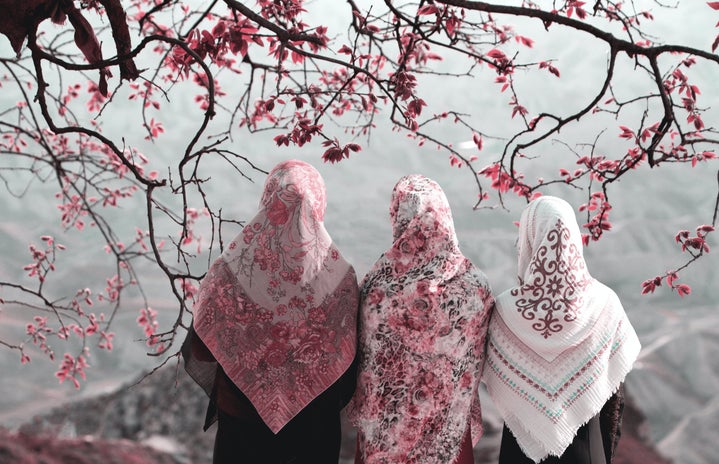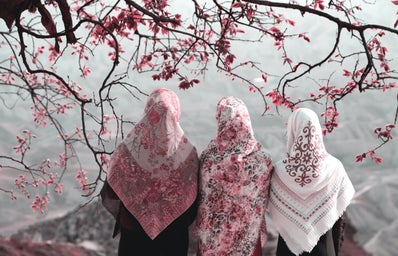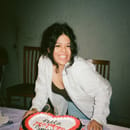In celebration of Muslim Women’s Day, I had the pleasure of interviewing my roommate, Eman Mahmoud, about her experiences as a Muslim woman in the United States. Since seeing her strong connection and love for her religion, I wanted to share her story with everyone. Here’s a glimpse into our exchange and her unique perspective on the questions asked.
Interview with eman mahmoud:
Could you share with us the journey of your experience as a Muslim woman living here in the United States?
“My experience hasn’t been good nor bad in the United States as a Muslim woman. There are a lot of women who wear the hijab, which is a headscarf for women. It symbolizes commitment to God and their faith. Personally, once I decide to wear a hijab in the future, I want to stay committed to it and wouldn’t want to remove it. That’s why I’ve sort of taken my time in wearing it. What I am trying to say in all of this is I don’t visibly or outwardly represent my faith.
If I were to wear the hijab, most people would know that I’m Muslim. However, If I didn’t, no one would really know what I am, where I’m from, or what my faith is. Overall, I never had a bad or a good journey. Although, I am leaning towards saying I’ve always had a good journey. Regardless of whether or not I wear the hijab, I am still active in the Muslim community. I’ve joined Muslim student associations at both my community college and UC Berkeley. I go to our local mosque, which is almost like a church. I still like participating and getting involved in my community. I still celebrate my faith, something that’s never stopping me from continuing.”
Can you elaborate more on how you maintain your Muslim identity while living in the U.S.?
“[I maintain my identity] by staying involved and connected to my community, whether it be volunteering at my local mosque, helping out at Sunday school, joining Muslim student associations at my community college and university. I’m also a part of a club called FAM at [UC] Berkeley, which is the faces of African Muslims so I basically celebrate both my identity as a Black African-American and as a Muslim — especially during Ramadan: that is our holy month of fasting. I always go to the mosque every week. You fast from sunrise to sunset during Ramadan, so we go break our fast at the mosque, and we eat with the community. Even being around a bunch of non-Muslims and people who have different faiths and different cultures, I still grew up in a way that religion and culture was very deeply rooted in my family. Of course, I’ll do my five day prayers, still practice my faith, and read our holy book: The Quran. That’s how I maintain my identity in the U.S.”
Can you tell us about a time when the crisis in the Middle East directly impacted your personal journey and understanding of your Muslim identity here in the U.S?
“Personally, I don’t have any experiences or something that happened to change my impact, but my mom was in the United States at the time when 9/11 occurred. My mom does wear the headscarf, which is called the hijab; so, of course, my mom faced a lot of discrimination and a lot of racism from people who were uneducated about Islam. All the propaganda going around about Muslims, and 9/11, and Muslims being terrorists was really bad at the time.
Even today, it’s still really bad. Whenever we travel, they always give my mom a hard time at the airport. They always pull her to the side and check her in public, embarrassing her in front of everyone, or put her in a private room. Regardless, they always make it such a difficult thing because she’s very outwardly, visibly Muslim; that made it hard growing up because you know yourself, your family, and your religion. You know it’s peaceful and there’s just a lot of misconception out there. So, of course that makes you feel bad about yourself. Sometimes, I’m not gonna lie, it makes people want to hide their identity, but for me, it never made me want to hide my identity. It’s actually the opposite. I wanted to prove people wrong and show them that Islam is a peaceful religion. We come from a peaceful background and someone’s identity and faith doesn’t change that, no matter what has happened in the Middle East or on 9/11.
I know once I put the hijab on, that will make me more of a target for people to discriminate [against] me, whether it’s at work or in school. Even though I know that there are laws to protect people, of course that is something that’s daunting and scary, but I don’t think that would make me any less proud of my faith, or afraid to show who I am and what I believe.”
“Sometimes, I’m not gonna lie, it makes people want to hide their identity, but for me, it never made me want to hide my identity. It’s actually the opposite.”
Eman Mahmoud
Can you share a positive experience where your Muslim identity has been embraced or celebrated in your community?
“One experience [in which] my identity was celebrated and embraced in my community was specifically at my community college. I just have this really vivid memory. We had an event. We wanted to do two events; at first an interfaith, which is joining other faith clubs at school and talking about our similarities. The other is the intrafaith — “intra” like “within Islam”, like the different cultures. We only ended up doing the intrafaith. All of the people in the Muslim Student Association club, which I was the president of, hosted an event where all of the members showcased their cultures and the different cultures within Islam. We had people from Asia. We had people from Africa. We had people from the Middle East, Pakistan, from all over; that was a really fun experience, just to show how Islam (my religion) doesn’t have a one size fits all look. Everyone is different shapes, colors, and sizes. We’re such a diverse place!
People always automatically associate the Middle East with Islam, but it’s actually the opposite. It was just a really nice event where I got to celebrate not only my culture, which is Sudanese, which is in East Africa, but also showing my proud Islam identity; it was really nice to show it to the community because the event was open to all students. We had a bunch of people come out to our event and support. They tried our food. We had slideshow presentations about our culture. We played some of our music. It was just a very nice event and I’m really glad that we did it. I definitely think it just showed the diversity of Islam and how great it is.”
“Islam doesn’t have a one size fits all look. Everyone is different shapes, colors, and sizes.”
Eman Mahmoud
Eman’s experiences highlight the diversity of Muslim identity in America and the importance of celebrating it. As we celebrate Muslim Women’s Day, let’s continue to support and appreciate Muslim women like Eman, who promote unity and understanding in our communities.



